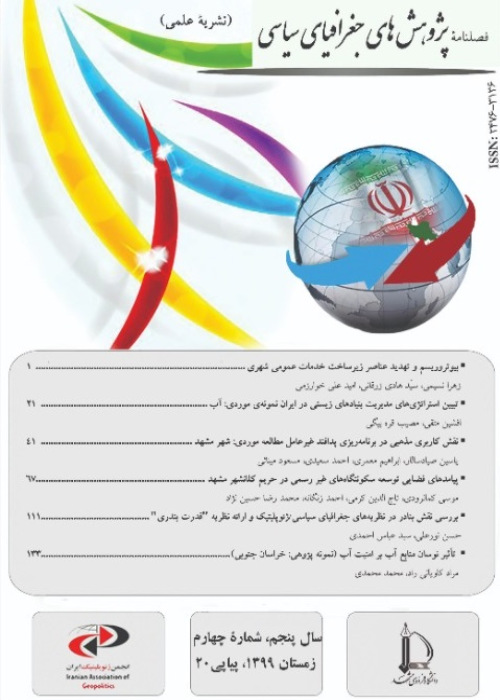Processing the Conceptual, Theoretical and Semantic Structure of the Term " State" and its Components
Author(s):
Abstract:
Introduction
The term state owing to its simultaneous presence in two epistemological and scientific fields named political science and political geography has assumed multiple meanings, applications, natures and synonyms, in a way that it has stirred a kind of chaos and lack of consensus, especially among political geographers. According to various texts, state is an abstract entity, intertwined with a selection of notions, values, and thoughts concerning human and spatial issues. Accordingly, the present research tries to analyze the spatial-philosophical aspects of the word state and answer the question as to the reasons why this word has gained varied and sometimes contradictory synonyms and meanings (especially in the fields of political science and political geography in Iran).Method
In terms of collecting the data, the present research is a qualitative one, and in terms of its nature is regarded as a foundational research. With respect to the method of processing and interpreting the data, Meta-analysis has been used. Meta-analysis is a collection of methods used to resolve the contradictions created by researches conducted concerning a single topic. Meta-analysis converts the findings of various researches to a joint scale, investigates the relation among research specifics and the findings and finally, proposes an overarching suggestion for converging the studies. The present research, in line with its objective which concerns the investigation of divergences and conceptual, theoretical and semantic contradictions of the term state among political geographys thinkers and theoreticians and its attempt to bring viewpoints, in an overarching manner, together can be categorized as a meta-analysis.Discussion
Every concept in geography, considering the comprehensive and holistic epistemological nature of this science, gains a comprehensive and universal feature, where no other rational trajectory neither can nor should be traversed, before unwinding the interwoven elements and components of this twisted skein. Nonetheless, it seems that any attempt to resolve such a conflict would be irrational. The only rational thing remains paying attention to the spatial, comprehensive, holistic and multiplicity basis in geographical concepts which stem from its epistemology. It seems that incorporation of spatial, geographical structures and factors such as land, country, nation, regime and governance have paved the way for its plurality of sense and profusion of meaning, to the degree that meanings and concepts of state are closer to reality that in addition to structure-agency views, incorporate spatial and holistic geographic views.So on the basis of the epistemological feature of geography (to which political geography belongs) the conceptual expansion and long range of inclusiveness in political geography is neither too surprising nor paradoxical. The word state contains simultaneous and multifold other meanings such as land, government , governance and people and unless these elements are included and combined in creating a whole, we cannot use the word state for it. Thus, only when the biologic and cultural feature specific to humans, i.e. territoriality, adopts a national (concerning a population with a given and fixed identity) and political (a country, when all the elements of the administration, governance, execution and management or government are organized) quality can it represent a word called state in the political geography.
Conclusion
State is an abstract concept, intertwined with a collection of concepts, values, and thoughts regarding human and spatial issues and owing to its simultaneous presence in two disparate epistemological and scientific fields called political science and political geography it has assumed multiple meanings, applications, natures and synonyms. The word state, in its general sense, has a meaning of condition and situation. This concept, in order to materialize in the fields under discussion, has no other way than to be manifested in its material components. Among the components of state, the concepts of nation, regime, and country has been used, many times, interchangeably thus causing multiple meanings for the concept of state such as country, regime, administrative, executive branch and etc. The findings of this research indicate that each of these concepts (country, regime and nation), in different situations where the concept of state can be situated, can carry its semantic features. For instance, when there is a geographical and territorial understanding of state , it comes very close to the concept of country and when its administrative-executive aspect is intended, it referrers to the government .So, the profusion of the meanings of state is not in contradiction with its main sense. To put it simply, state in some situations is synonymous with country and in others with government or political society. This does not damage its abstract and main meaning, since without these components, state has no meaning and in order to become materialized and manifest in various situations, it is dependent upon its constituent elements.Keywords:
State , Country , Government , Nation
Language:
Persian
Published:
Research Political Geography, Volume:1 Issue: 2, 2016
Pages:
79 to 107
magiran.com/p1575619
دانلود و مطالعه متن این مقاله با یکی از روشهای زیر امکان پذیر است:
اشتراک شخصی
با عضویت و پرداخت آنلاین حق اشتراک یکساله به مبلغ 1,390,000ريال میتوانید 70 عنوان مطلب دانلود کنید!
اشتراک سازمانی
به کتابخانه دانشگاه یا محل کار خود پیشنهاد کنید تا اشتراک سازمانی این پایگاه را برای دسترسی نامحدود همه کاربران به متن مطالب تهیه نمایند!
توجه!
- حق عضویت دریافتی صرف حمایت از نشریات عضو و نگهداری، تکمیل و توسعه مگیران میشود.
- پرداخت حق اشتراک و دانلود مقالات اجازه بازنشر آن در سایر رسانههای چاپی و دیجیتال را به کاربر نمیدهد.
In order to view content subscription is required
Personal subscription
Subscribe magiran.com for 70 € euros via PayPal and download 70 articles during a year.
Organization subscription
Please contact us to subscribe your university or library for unlimited access!


